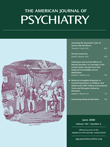Negative Self-Defeating Attitudes: Factors That Influence Everyday Impairment in Individuals With Schizophrenia
To The Editor: We read with much interest the editorial by Philip D. Harvey, Ph.D., and Barbara A. Cornblatt, Ph.D. (1) , in the February 2008 issue of the Journal . We agree that the standardization of cognitive measures in the treatment of individuals with schizophrenia unquestionably represents a major advancement in the field. However, it might be of some interest to affiliation that neurocognitive disturbances do not—in and of themselves—directly account for the poor quality of life experienced by many individuals with severe mental illness. In our clinical research, we found that it was the impact of impairment on these patients’ experiences (e.g., failure, rejection) and, consequently, their attitudes toward themselves and their expectations that were reflected in their quality of life (2) . Cognitive impairment, although the primary factor in the causal chain, was only indirectly connected to quality of life and everyday functioning.
In a recent study, we found that patients’ negative attitudes toward performance mediated between neurocognitive dysfunction (as measured by a battery of tests) and quality of life and negative symptoms (3) . If these results are reliable, then such negative, self-defeating attitudes might be appropriate therapeutic targets.
1. Harvey PD, Cornblatt BA: Pharmacological treatment of cognition in schizophrenia: an idea whose method has come. Am J Psychiatry 2008; 165:163–165Google Scholar
2. Beck AT, Rector N, Stolar NM, Grant PM: Schizophrenia: Cognitive Theory, Research and Therapy. New York, Guilford Press (in press)Google Scholar
3. Grant PM, Beck AT: Defeatist beliefs as a mediator of cognitive impairment, negative symptoms and functioning in schizophrenia. Schizophr Bull 2008 (in press)Google Scholar



